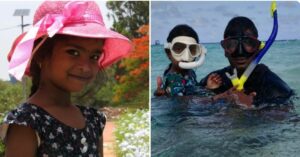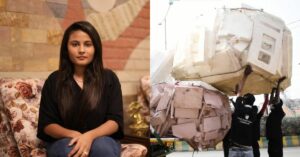‘Maka Naka Plastic’: One Man’s Mission to Make Goa Plastic Free
India's favourite getaway Goa is battling a severe plastic waste problem. This alarming situation led Sanjiv Khandelwal to start 'Maka Naka Plastic', a campaign to combat plastic pollution with cloth bags made from pre-loved fabric.
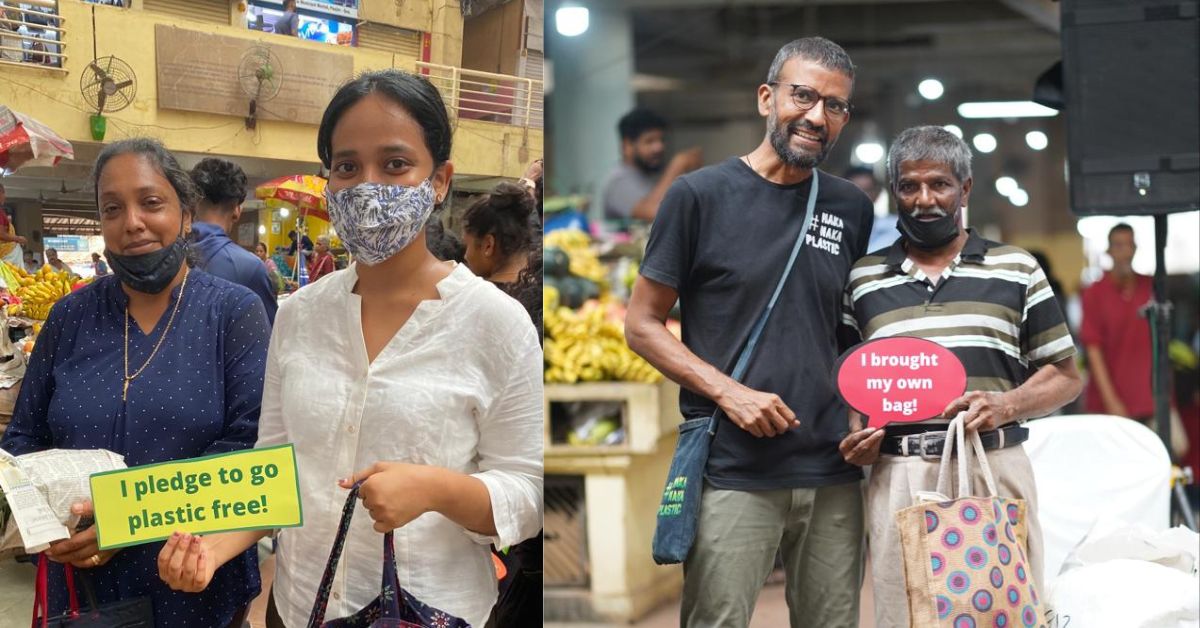
As per a Central Pollution Control Board report, Goa, the smallest Indian state, has the highest per capita income but also produces the most plastic waste per person. In 2019-20, it ranked first in plastic waste generation in the country, producing 12,000 grams of plastic waste per capita annually.
This surprising fact contrasts with Goa’s reputation for beautiful beaches and scenic hills.
Clinton Vaz of VRecycle Waste Management Services — which manages the waste of 45,000 households in Goa and has been working in this sector for more than 15 years now — says, “Now recyclable waste in Goa is around 40 percent which was once 80 percent, as now most of our waste is non-recyclable and single-use plastic.”
Most of this single-use plastic primarily comprises the freely distributed plastic carry bags in nearly all retail shops. According to a dipstick survey conducted by Sensible Earth — a Goa-based organisation dedicated to promoting sustainable practices — 60,000 plastic carry bags are used every single day in Goa.
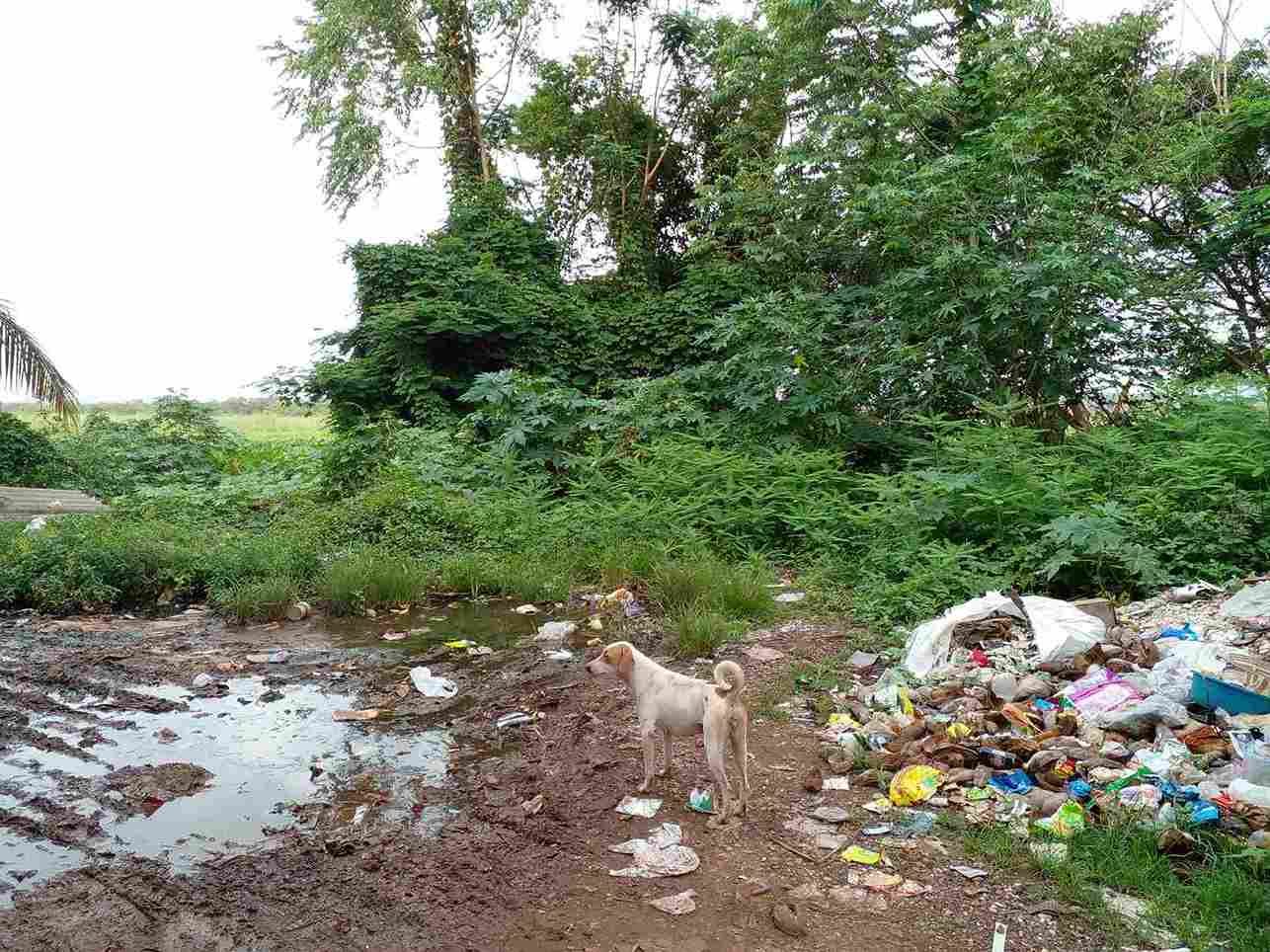
These bags are commonly for their convenience and are later repurposed as liners for dustbins. Consequently, these bags ultimately find their way to roadside garbage heaps, water bodies, wetlands, and eventually landfills.
Sanjiv Khandelwal, founder of Sensible Earth, adds that the current figure post-pandemic is more alarming. “In our estimation, the number is now beyond one lakh plastic bags per day because of the increasing population and consumption post-pandemic. This figure is a combination of primary and secondary research, but largely extrapolation,” he says.
Deeply disturbed by the rampant littering and indiscriminate disposal of garbage, Kandelwal started the ‘Maka Naka Plastic’ campaign in October 2021.
‘Maka naka plastic’ translates to ‘I don’t want plastic’ in Konkani, Goa’s official language. The campaign involves making different types of bags from pre-loved fabric which is collected through collection drives at Sensible Earth and also in partnership with the city corporation of Panaji. They use social media and newspapers as means to ask citizens to donate pre-loved clothes.
The journey from complaining to catalysing change
“I decided to take away the right only to complain and start doing something about it,” says Khandelwal, a 59-year-old serial entrepreneur, early-stage investor, and mentor to tech startups, who has a rich history in the internet sector. He played a pioneering role in developing B2B marketplaces, wireless networks, and dynamic pricing engines. His noteworthy work even became the subject of a case study at IMD in Lausanne.
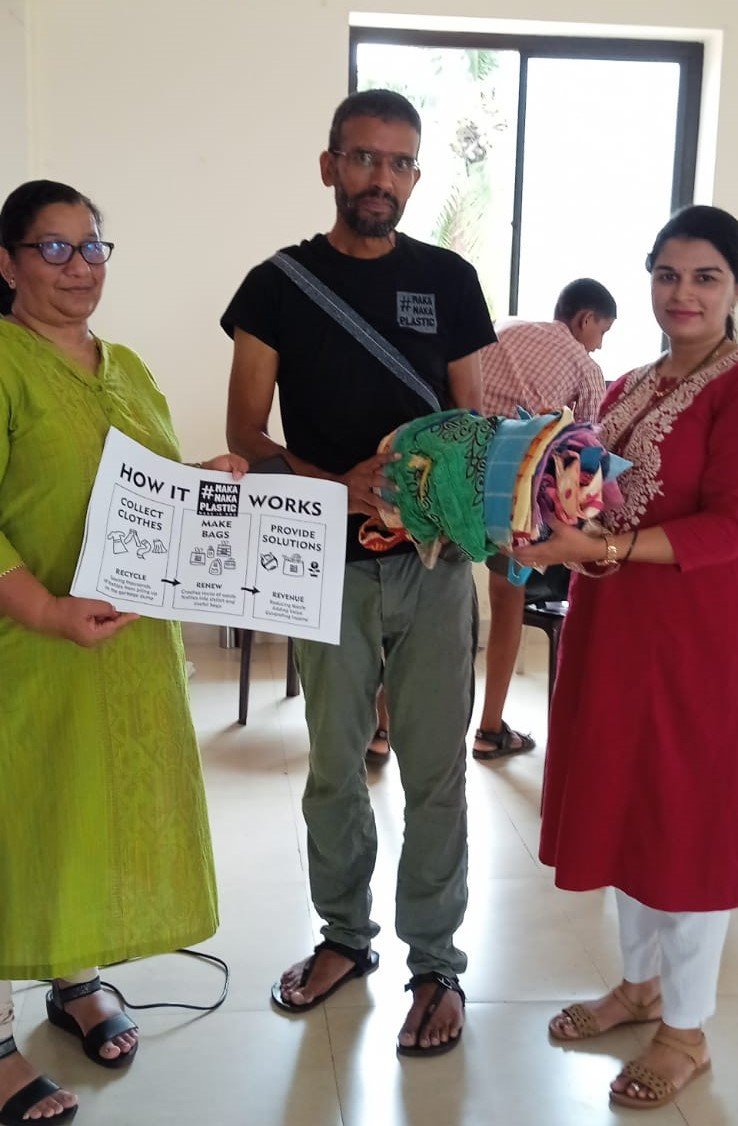
Throughout his life, Khandelwal shares that he has been dedicated to sustainability and mentoring. He is driven to establish practical ecosystems that support sustainable initiatives. In 2019, he founded Sensible Earth, the centre for sustainability, in Goa.
He says that Sensible Earth serves as an incubator for sustainability-focused initiatives, with a particular emphasis on strengthening local ecosystems, reducing waste, and creating solutions for upcycling and recycling. Some prominent initiatives under his leadership include the #makanakaplastic campaign and Zeroposro.
His journey began in the Philippines, where he received his education before studying business management at Boston University. Despite early internships with major consulting firms, he says he always maintained an entrepreneurial spirit.
In 2018-19, Khandelwal embarked on a transformative solo journey on his Triumph Tiger motorcycle, exploring India, South Africa, and Morocco. During this adventure, he encountered the profound challenges of climate change in these regions. He says these experiences deeply affected him, inspiring him to take action rather than simply lamenting the issues. This pivotal moment led him to relocate to Goa and establish Sensible Earth as a means to make a positive impact on the world’s environmental challenges.
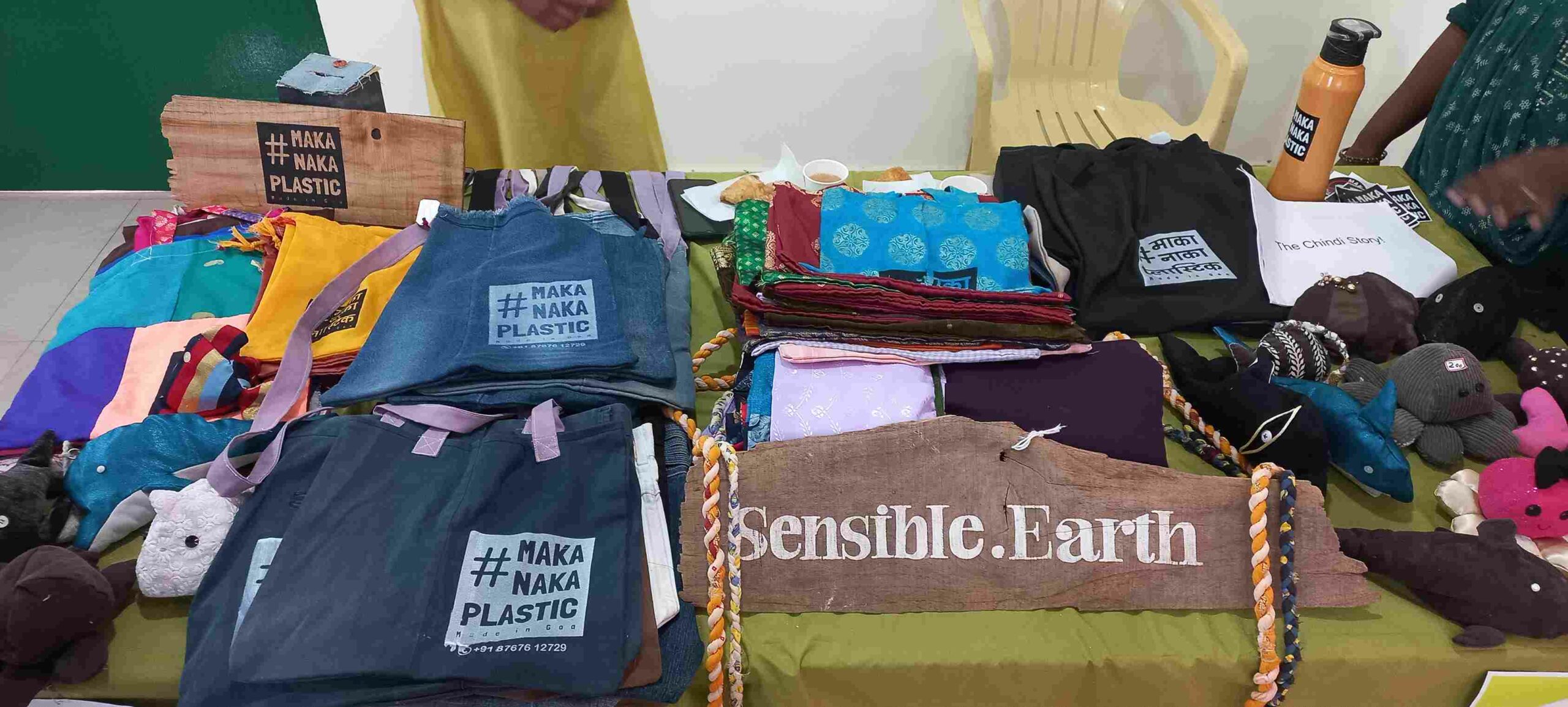
Saving the environment, one cloth bag at a time
Through the Maka Naka Plastic campaign, Khandelwal aims to address three key issues — reducing the use of non-recyclable plastic bags; diverting pre-loved fabric from ending up in landfills; and creating employment opportunities for women involved in crafting these bags.
“These plastic bags cannot be recycled, considering that historically, only nine percent of plastic has been recycled. Additionally, it’s surprising to note that textiles — mainly composed of non-biodegradable materials like nylon and polyester — rank as one of the largest contributors to global landfills, making up 60 percent of landfill content. Therefore, this campaign addresses both of these significant issues while also providing a livelihood for women,” he adds.
Over the past two years, this campaign has garnered significant support from citizens and local communities, particularly from panchayats and municipalities. A notable example of this support was seen at the Panjim Municipal Market.
Sensible Earth — along with the Corporation of the City of Panjim; TERI (The Energy and Resources Institute); GIZ (Deutsche Gesellschaft für Internationale Zusammenarbeit); IndiaNAMA-Circular Waste Solutions; and FLIP — launched a 21-day programme that started on 5 June, 2022.
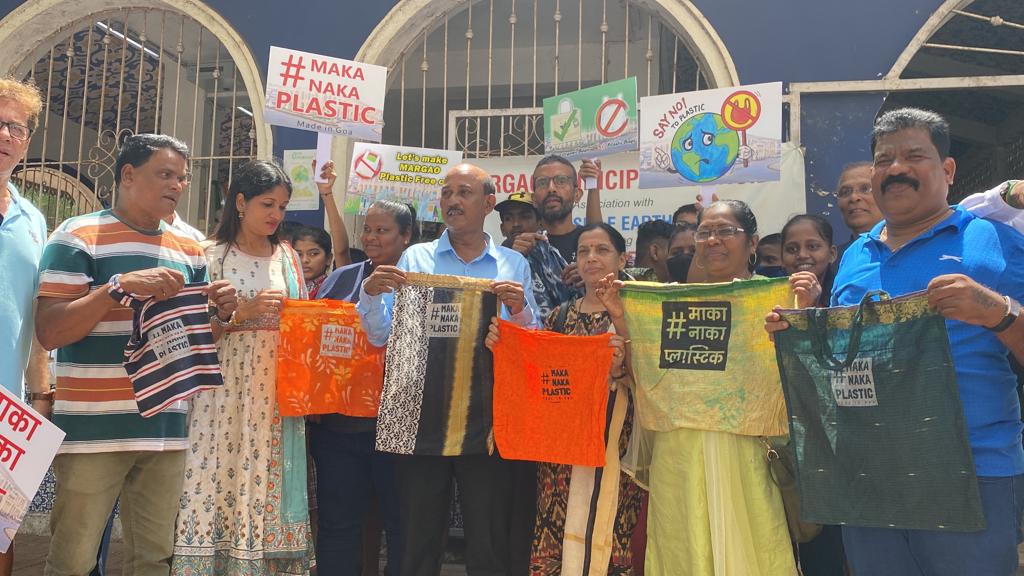
The programme distributed 6,000 cloth bags free of cost to market visitors. Additionally, students from the Community Classroom- Nagalli Taleigao, along with local schools, volunteered to raise about the importance of using cloth bags and their positive impact on our ecology and health.
Vishal Rawley, artist and educator at Community Classroom says, “The campaign provided a great opportunity for us to have a conversation with people about problems associated with plastic. The children were very excited to share this information. We collected plastic bags and exchanged them for cloth bags, creating a chain that stretched so long it could encircle the entire Panjim market. We even organised a procession where we carried this chain to the Mandovi river, which is next to the market area, and it extended for around one kilometre. We also crafted masks from these bags, referring to them as ‘plastic monsters’, and created posters among other activities.”
“As we were there for 21 days, we observed many people beginning to bring their own stitched cloth bags. We also noticed that many of them returned with our Maka Naka bags during their next shopping trip! Even small changes like this are a significant achievement,” he adds.
Khandelwal shares that to date, the campaign has made approximately one lakh cloth bags, prevented 70,000 garments from ending up in landfills, and saved about two million plastic bags from being used.
Making these bags is a challenging task, requiring tailors to carefully choose the right fabric for each bag’s size and shape while ensuring they look appealing. The tailors involved in this project are mostly women from various self-help groups. Currently, there are around 72 of them.
One of the tailors, Sangeeta Chari says, “If people continue using these bags which we stitch, Goa will soon become plastic-free.” She informs that earlier, she used to pursue tailoring as a hobby, but now, it has become a source of income for her. “I make bags from the fabric given to us and get Rs 10 per bag. I believe this is profitable as one gets to do a job by sitting at home while earning some income.”
You can find these bags for free (or ‘pay as you like’) at select Goan markets as part of the campaign. They are also sold to brands, government organisations, schools, and more.
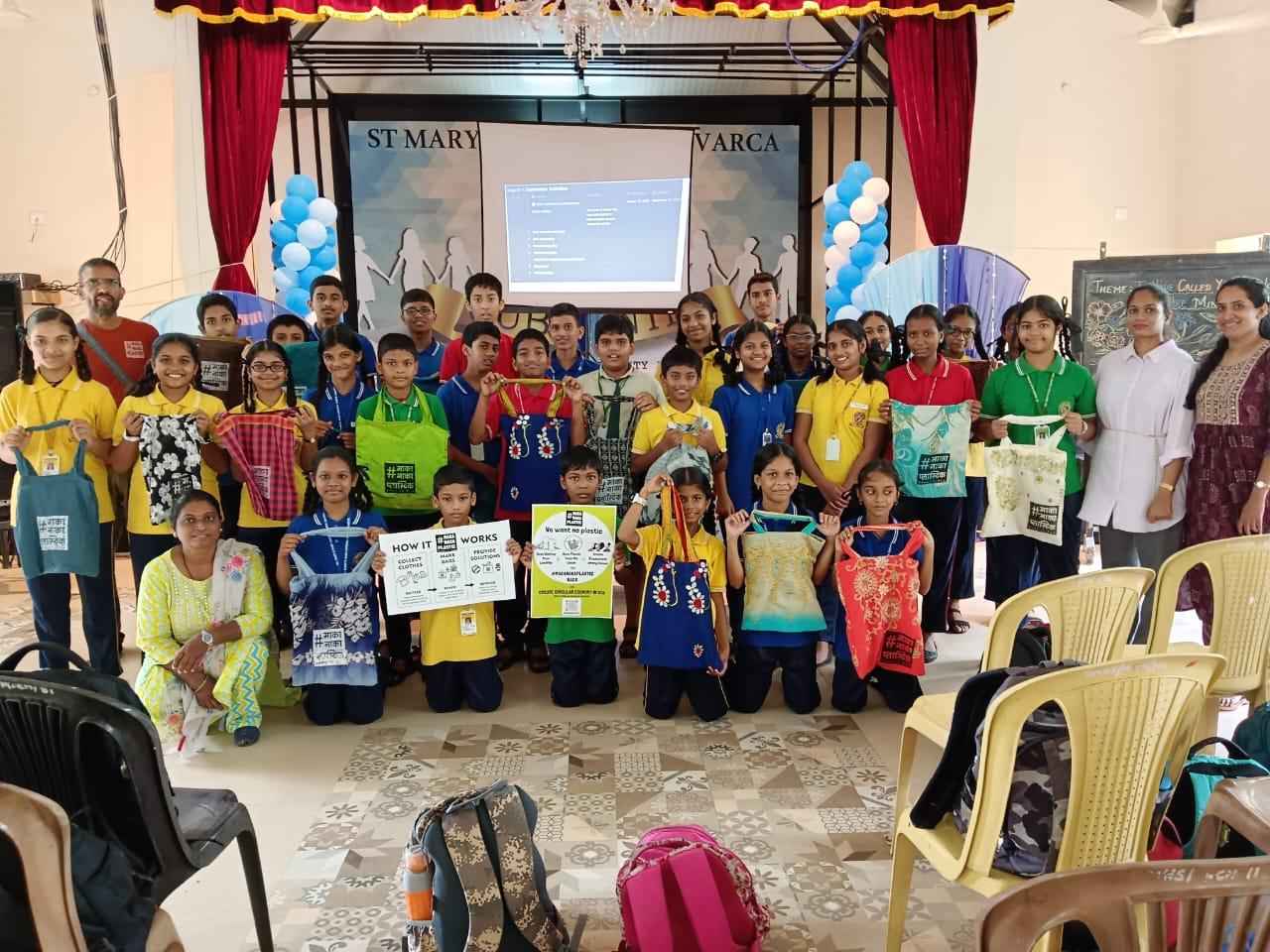
Empowering schools and communities
To spread awareness and change the behaviour of consumers towards plastic use, Khandelwal has taken this campaign to local schools. “When we initially launched the campaign, we believed that stitching 10,000 bags would address the issue. However, now that we have reached the milestone of creating one lakh cloth bags, we realise that we have only just begun. That’s why we have come up with the Maka Naka Plastic School programme,” elaborates Khandelwal.
So far, they have covered 34 schools and engaged 3,400 students in this campaign. They aim to reach around 10,000 students and establish a Maka Naka Plastic chapter in each school.
In schools, the campaign promotes collecting pre-loved fabric to create cloth bags and sell them to fund their eco clubs. Some schools are also designing posters and displaying them in public areas, such as shops, community halls and panchayats.
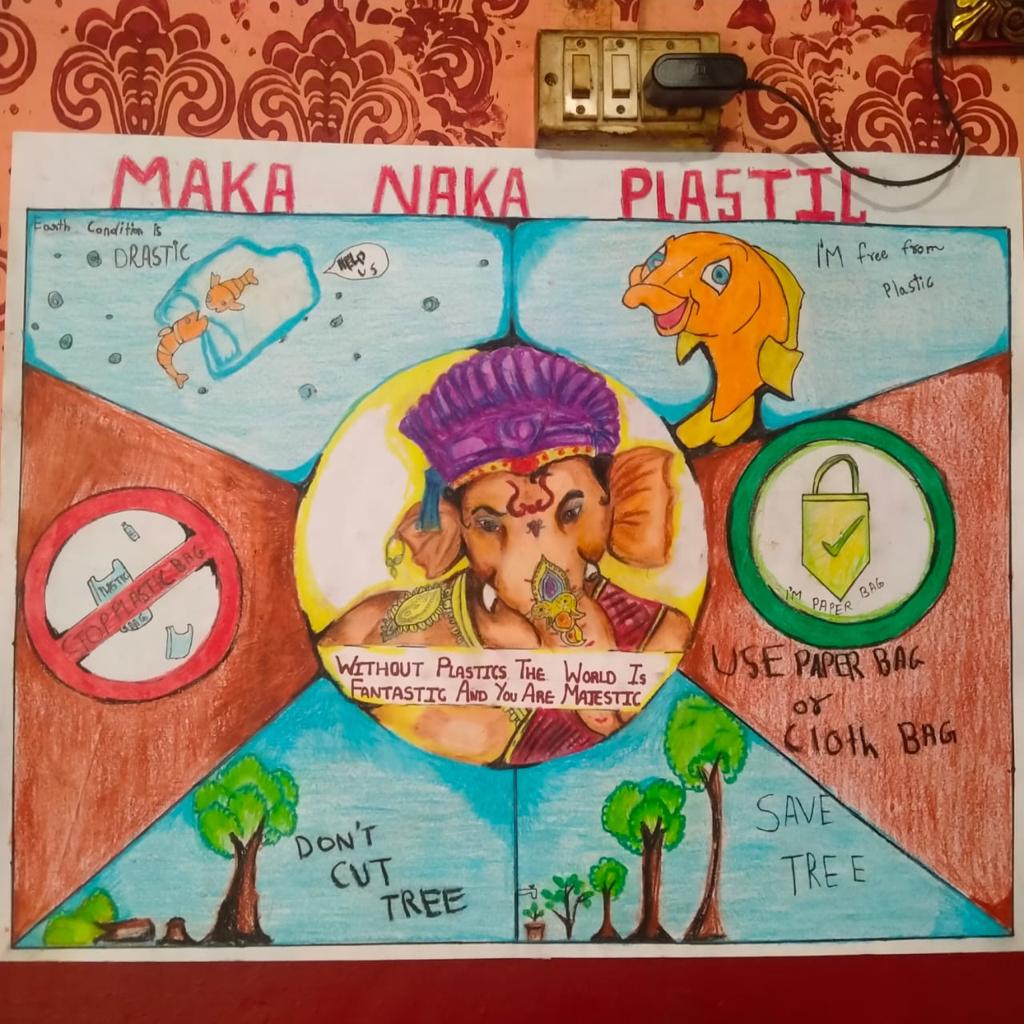
In addition to the Maka Naka Plastic campaign, they are also involved in the ‘Zero Posro’ store, launched by Jonah Fernandes. This store strongly opposes plastic packaging and encourages customers to utilise reusable cloth bags or glass containers.
“We are tackling two issues here. First, we have noticed that only six percent of the produce is local, while the rest comes from neighbouring states. That’s why we promote local and organic produce. Second, we’re tackling the issue of plastic and dry waste. Around 80 percent of our household dry waste, such as plastic, glass, and paper, comes from our kitchens,” adds Khandelwal.
The Sensible Earth is actively collecting glass jars, having already collected 2,000 with a target of reaching 10,000. Khandelwal points out that recycling glass can have a higher environmental impact, so, they have launched a campaign to collect, clean, and store glass jars in collaboration with local self-help groups. They are now exploring ways to repurpose these jars within Goa’s food industry.
Khandelwal maintains that this battle with plastic or waste, in general, is a long-drawn affair, and there is an ongoing need to raise awareness. He highlights the importance of changing the perception of Goa, which is often solely associated with fun and enjoyment. This perception puts tremendous pressure on waste management and the environment, especially considering the fact that Goa receives four times more tourists than its actual population (15 lakhs).
“We need to change the narrative of tourism in Goa. It is a biodiversity hotspot, an extremely fragile ecosystem, and one has to walk carefully here,” says Khandelwal. If you found our stories insightful, informative, or even just enjoyable, we invite you to consider making a voluntary payment to support the work we do at The Better India. Your contribution helps us continue producing quality content that educates, inspires, and drives positive change. Choose one of the payment options below for your contribution- By paying for the stories you value, you directly contribute to sustaining our efforts focused on making a difference in the world. Together, let’s ensure that impactful stories continue to be told and shared, enriching lives and communities alike. Thank you for your support. Here are some frequently asked questions you might find helpful to know why you are contributing?

Written by Arti Das; All photos courtesy Arti Das.
(Edited by Pranita Bhat)
Sources:
‘Annual Report 2019-20 on Implementation of Plastic Waste Management Rules, 2016‘ by Central Pollution Control Board Delhi
‘Goa tops in per capita plastic waste generation‘ by O Heraldo, Published on 10 October, 2021.
‘Goa is expecting to welcome 81 lakh tourists, on par with pre-pandemic time‘ by Financial Express, Published on 13 December, 2022.
This story made me
-
97
-
121
-
89
-
167




